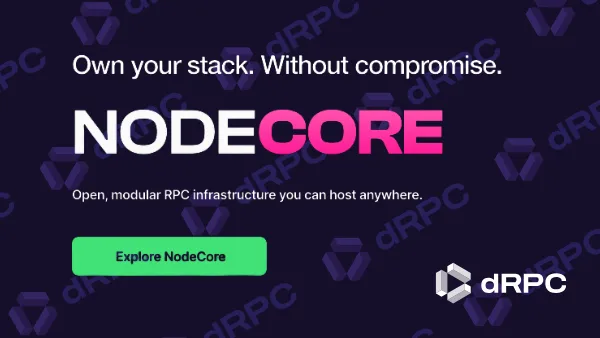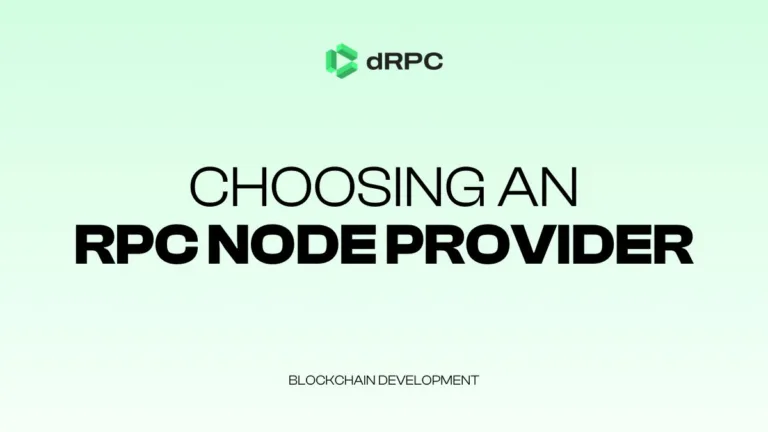Introduction
In Web3 infrastructure, most projects eventually hit a critical decision point: Do you continue relying on cloud-hosted RPC providers, or take control of your stack with on-premise RPC infrastructure?
For dApps handling sensitive workloads, chains preparing for scale, and any team looking to eliminate vendor lock-in, NodeCore offers a new path forward. It’s open-source, self-hosted, and battle-tested — giving you the same high-reliability RPC stack that powers dRPC’s own cloud offering (NodeCloud), without losing ownership of your infrastructure.
Why NodeCore Exists
RPC infrastructure is the backbone of every blockchain application. Without it, dApps can’t query state, chains can’t onboard developers, and users face broken experiences. The market today is dominated by cloud-only services — fast to deploy but centralised and opaque.
NodeCore flips the model. Instead of renting opaque infrastructure, you run the exact same proven stack used at massive scale in NodeCloud — with all the AI-based load balancing, failover logic, and multi-provider orchestration — entirely under your control.
Who Would Use NodeCore Today
NodeCore is designed for technical teams who need to own their RPC layer. That includes:
-
High-volume dApps running their own nodes to ensure predictable performance & cost
-
Blockchain foundations providing public RPC access without relying on third parties
-
Institutions & enterprises with compliance or security requirements restricting off-site infrastructure
-
Scaling projects preparing for surges in developer or user traffic
If your project fits into one of these categories — and you want your RPC stack to be as reliable as your code — NodeCore is the logical choice.
Battle-Tested Reliability
NodeCore isn’t an unproven framework. It’s the same core stack that runs inside NodeCloud, dRPC’s managed cloud RPC platform, which:
-
Handles 4+ billion requests per day
-
Powers 3,000+ dApps across 50+ providers
-
Delivers up to 3× cost savings vs. other RPC platforms
Running NodeCore on your own infra means deploying a system that’s been stress-tested at global scale — with all the performance tuning, failover logic, and observability already built in.
Technical Overview
NodeCore ships as a modular, open-source platform for orchestrating blockchain RPC traffic across multiple node providers or instances. Its architecture has three main pillars:
1. AI-Based Load Balancing
At the heart of NodeCore is a smart balancing system that evaluates:
-
Latency — real-time measurement of how quickly a provider responds
-
Error probability — tracking and avoiding providers likely to fail on a given request
-
Provider capabilities — ensuring only nodes that can handle a specific method are considered
This isn’t simple round-robin — NodeCore uses adaptive strategies:
-
One-off strategy for sticky sessions (e.g.,
eth_getFilterChanges) -
Retry strategy for most calls, automatically re-routing failed or slow requests to better providers
Geo-routing ensures requests are served from the closest region, reducing latency and improving reliability.
2. Provider-Agnostic Orchestration
NodeCore doesn’t care where your nodes are hosted. It can manage:
-
Self-hosted bare metal nodes
-
Cloud-hosted instances (AWS, GCP, Azure)
-
Third-party provider endpoints
By treating each as a scorable provider, NodeCore can optimise traffic across a mixed infrastructure — ensuring best performance and fair distribution.
3. Observability & Cost Efficiency
NodeCore comes with a metrics layer that gives infra teams:
-
Real-time provider performance charts
-
Request success/fail breakdowns
-
Historical trends for usage planning
Its pricing logic (even in self-hosted mode) follows a cost-lock + final adjustment model — ensuring that every request’s cost aligns with actual work performed, eliminating overcharging risks.
Customising NodeCore with NodeCraft
For many teams, NodeCore works perfectly out of the box. But some use cases demand more than the standard balancing logic or dashboards. That’s where NodeCraft comes in.
NodeCraft is dRPC’s custom development service, enabling:
-
Custom balancing strategies tailored to specific workloads
-
Integration with proprietary monitoring or alerting systems
-
Automated scaling triggers based on internal KPIs
-
Advanced security and access control features
If NodeCore is your self-hosted RPC engine, NodeCraft is the custom shop that tunes it for your exact race.
Skip the Frontend-Only Tool (eRPC)?
Some teams confuse NodeCore with eRPC-style solutions — lightweight tools that cache data for frontend queries. But the difference is fundamental:
-
eRPC is built for frontend performance boosts, not full-stack control
-
NodeCore is built for infra teams running complete RPC environments, managing uptime, balancing across providers, and integrating into CI/CD pipelines
If you want control from request routing to node orchestration, eRPC isn’t the right fit — NodeCore is.
How NodeCore Compares to Other On-Premise Solutions
Most on-prem RPC stacks today are custom builds — stitched together with Nginx load balancing, manual failover scripts, and open-source explorers. These solutions are:
-
Costly to maintain
-
Slow to adapt to new chains
-
Opaque in performance data
NodeCore consolidates these into one deployable package, pre-tuned for multi-chain environments and supported by a global team that has already solved scaling problems at the billions-of-requests level.
Business Value
Deploying NodeCore offers:
-
Infrastructure independence — no vendor lock-in
-
Lower long-term costs — no per-request cloud markups
-
Faster scaling — deploy globally in days, not months
-
Improved resilience — multi-provider failover by design
For technical decision-makers, this is future-proofing your RPC layer without giving up the optimisations that make cloud solutions attractive.
Conclusion
NodeCore delivers what most self-hosted RPC environments lack:
battle-tested performance, AI-based balancing, multi-provider orchestration, and full observability — all open-source and under your control.
For teams ready to own their stack without reinventing the wheel, NodeCore is the first choice.
Extra Links






